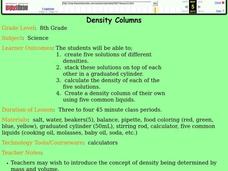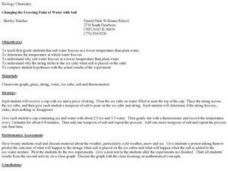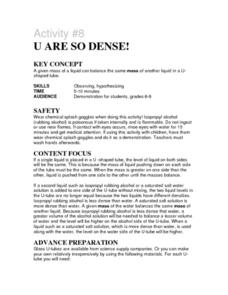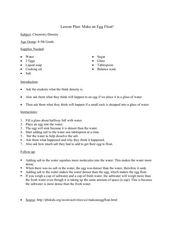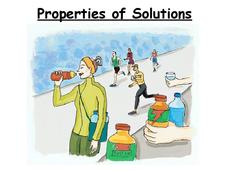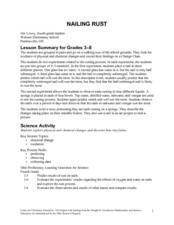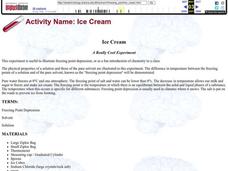Curated OER
I Have the Solution!
Students explain how to make solutions with specific concentration. In this chemistry lesson, students differentiate acids and bases. They calculate molarity of solutions.
Curated OER
Density Columns
Eighth graders create solutions with 5 different densities. In this chemistry lesson, 8th graders analyze the density of solutions stacked on top of each other. They document their data through graphing. This assignment requires 4 class...
Curated OER
Capillary Action and Adhesion
Students perform classroom experiments to observe adhesion. They perform a second experiment using sand, salt, water, and a heat lamp to observe the principle of capillary action. They also experiment with adhesion in plants.
Curated OER
Properties of Salt
Students see how the properties of salt affect the color of flame, the flow of electricity, and the freezing temperature of water. They identify salt and sugar crystals under a microscope and discuss various practical uses of salt.
Curated OER
Changing the Freezing Point of Water with Salt
First graders explore freezing points. In this science lesson plan, 1st graders determine the temperature at which water freezes, understand why salt water freezes at a lower temperature than plain water, and understand why the string...
Curated OER
Corrosion/Conservation/Preservation
Students examine the reasons why metal corrodes in regard to metal artifacts. In groups, they discover the affects of salt water on metal and compare the type of corrosion found on iron. They also research the types of metal...
Curated OER
Chapter 22 - 25 Review
For this chemistry review worksheet, students explore their knowledge of solutions, acid and bases, nuclear reactions, and radioactive decay as they answer 33 matching, fill in the blank, and short answer questions.
Curated OER
Activity #8 U Are So Dense!
Students watch as the teacher demonstrates: if a single liquid is placed in a U-shaped tube, the level of liquid on both sides are the same. When the mass is greater on one side than the other, liquid is pushed from one side to the...
Curated OER
Make An Egg Float!
Students analyze density. In this density lesson, students experiment with floating an egg. Students discover that salt added to water changes the density of the water allowing an egg to float.
Science Geek
Properties of Solutions
Study the properties of solutions as they relate to mixtures. The slide show presents the key concepts involved with solutions including solvents, solutes, solubility, and electrolytes. Scholars learn the basics of the properties of...
Virginia Department of Education
Aspirin Analysis
Laughter may be the best medicine, but aspirin is also important. Young chemists analyze aspirin tablets using titration in this lab experiment. They then repeat the entire experiment using a different aspirin brand.
Curated OER
Solutions and Solubility Review
In this solutions and solubility review activity, students are given main ideas about intermolecular forces, concentrations of solutions, molar solutions, ionic equations, solubility rules, acids and bases and titrations. Students answer...
Curated OER
Desalination: Creating a Solar Still
To better understand how solar power can aid in creating desalinated drinking water, the class creates a model still. They will build a model of a solar still, make observations, and discuss how the process works. While the idea behind...
American Chemical Society
Energy Levels, Electrons, and Ionic Boding
Learners see how electrons are transferred in the bonding of NaCl. They then create models of NaCl using styrofoam balls and toothpicks to assist them in explaining the formation of ions and ionic bonding.
Curated OER
Nailing Rust
When your upper elementary or middle school class is learning about chemical changes, these activities help demonstrate the concepts. In Part A, they submerge and place a nail partially underwater, then after a week they make...
Curated OER
Buoyant Behavior
Combine science and literature with this instructional activity on buoyancy. Read There's an Ant in Anthony by Bernard Most to examine words containing the letters a, n, and t. Then introduce your class to the word "buoyant." Demonstrate...
Curated OER
11 - The Heat Is On
Pupils observe physical change of melting by observing substance in original state, melting substance, allowing substance to return to original temperature, determining if substance retained its original properties, and recording results.
Curated OER
Word Equation Questions
In this chemical equations worksheet, students are given 37 word equations and they complete each by filling in the product or reactant that is missing using words.
Curated OER
Creating a Pond Habitat
Students create a pond habitat inside and outside their classroom. In this pond lesson plan, students create a habitat with animals, water, and plants in order to create a proper pond habitat.
Curated OER
Nothing New? A Physical Change
Fifth graders discuss the differences between chemical and physical changes. In groups, they complete experiments and discover how a physical chnage can be reversed. To end the lesson, they review the steps of the water cycle and...
Curated OER
Ice Cream
Students are shown an experiment making ice cream while discovering the freezing point depression. There are questions for students to answer after the demostration.
American Chemical Society
Middle School Chemistry: Lesson Plans: Why Does Water Dissolve Salt?
Students use their own model of a salt crystal and water molecule to show how water dissolves salt. Then, they relate their observations to the structure of salt, water, and alcohol on the molecular level.
CK-12 Foundation
Ck 12: Earth Science: Seawater Chemistry
[Free Registration/Login may be required to access all resource tools.] Describes dissolved ions in seawater and their source.
CK-12 Foundation
Ck 12: Earth Science: Seawater Chemistry Study Guide
[Free Registration/Login may be required to access all resource tools.] This study guide summarizes key points about the composition of ocean water. Includes a few questions to check for understanding.



